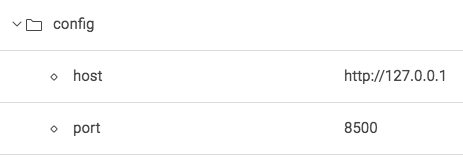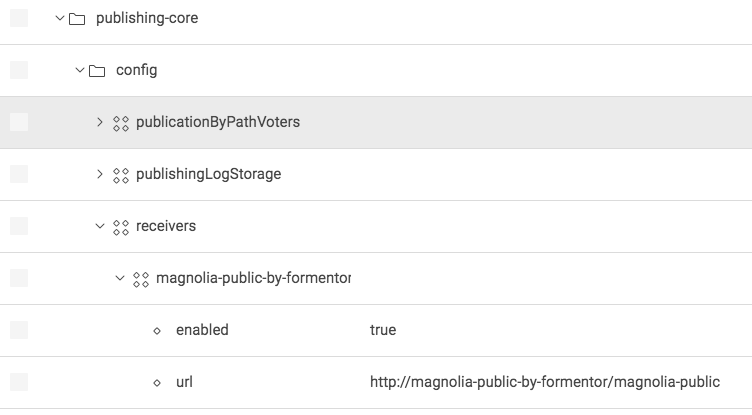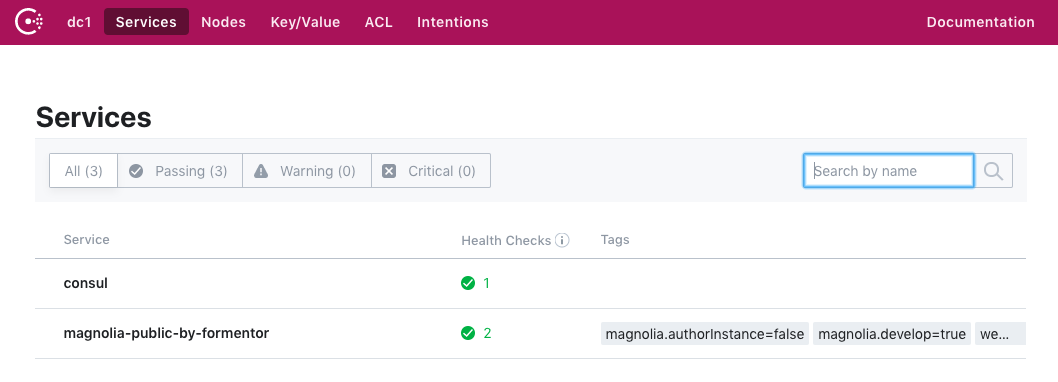Registers magnolia instances in Consul Service Discovery
Exposes endpoint GET /.rest/health as health indicator of magnolia
{
"status": "UP"
}
Registers magnolia instance as a service in Consul service discovery
Set of endpoints to register and deregister magnolia in Consul
POST /.rest/magnolia-cloud-service/register
POST /.rest/magnolia-cloud-service/deregister
Configuration of receivers in publishing module with service name instead of the IP or DNS of magnolia public instances. Magnolia public instances register in Consul with a service name and consul translates service name to the IP of the server where magnolia is deployed.
If the domain or IP is not registered in Consul a service then it works as usual
Integration with Consul v1.4.3
The java interface com.formentor.magnolia.cloud.ServiceDiscovery specifies the implementation of the service to register magnolia in a Service Discovery system
public interface ServiceDiscovery<T> {
boolean registerService();
boolean deRegisterService();
boolean deRegisterService(T service);
boolean registerService(T service);
List<ServiceInstance> getInstances(String serviceName);
}
It can be used any Service Discovery using the below interface.
Name of the service
The property magnolia.cloud.appName of magnolia specifies the name of the service registered in Service Discover. The same name can be use by magnolia instances that have the same purpose. For example magnolia-author for the author instance and magnolia-public for public instances.
# Name used as a cloud service
magnolia.cloud.appName=magnolia-public-by-formentor
Consul configuration
Consul is configured in the configuration of magnolia-cloud-service module

Receiver is Publishing core
The module implements a custom DefaultSender that translates the domain of the url of receivers to the real IP.
If the domain is not registered as a service in Consul then uses the url.

The module includes a bootstrap that configures a Consul deployed in localhost. Steps to use this module
1- Install consul following the guide of hashicorp (it is really simple) https://learn.hashicorp.com/consul/getting-started/install
2- Start Consul
$ consul agent -server -bootstrap-expect=1 -data-dir=./consul-server-data -node=sever-one -domain domain_name -bind 127.0.0.1 -enable-script-checks=true -ui
3- Add the dependency of this module to a magnolia bundle, build the bundle and start
4- The bundle of magnolia will register in Consul as an instance of the service with the name especified in the property magnolia.cloud.appName
Services can be seen using the ui of Consul

NOTE
The use of service discovery is recommended when magnolia is consumed by many services and it is usual to create and destroy instances of magnolia. In this case you avoid to change the IP in every service.
It's easy to create components for Magnolia and share them on github and npm. I invite you to do so and join the community. Let's stop wasting time by developing the same thing again and again, rather let's help each other out by sharing our work and create a rich library of components.
MIT
Formentor Studio, http://formentor-studio.com/
Joaquín Alfaro, @Joaquin_Alfaro
